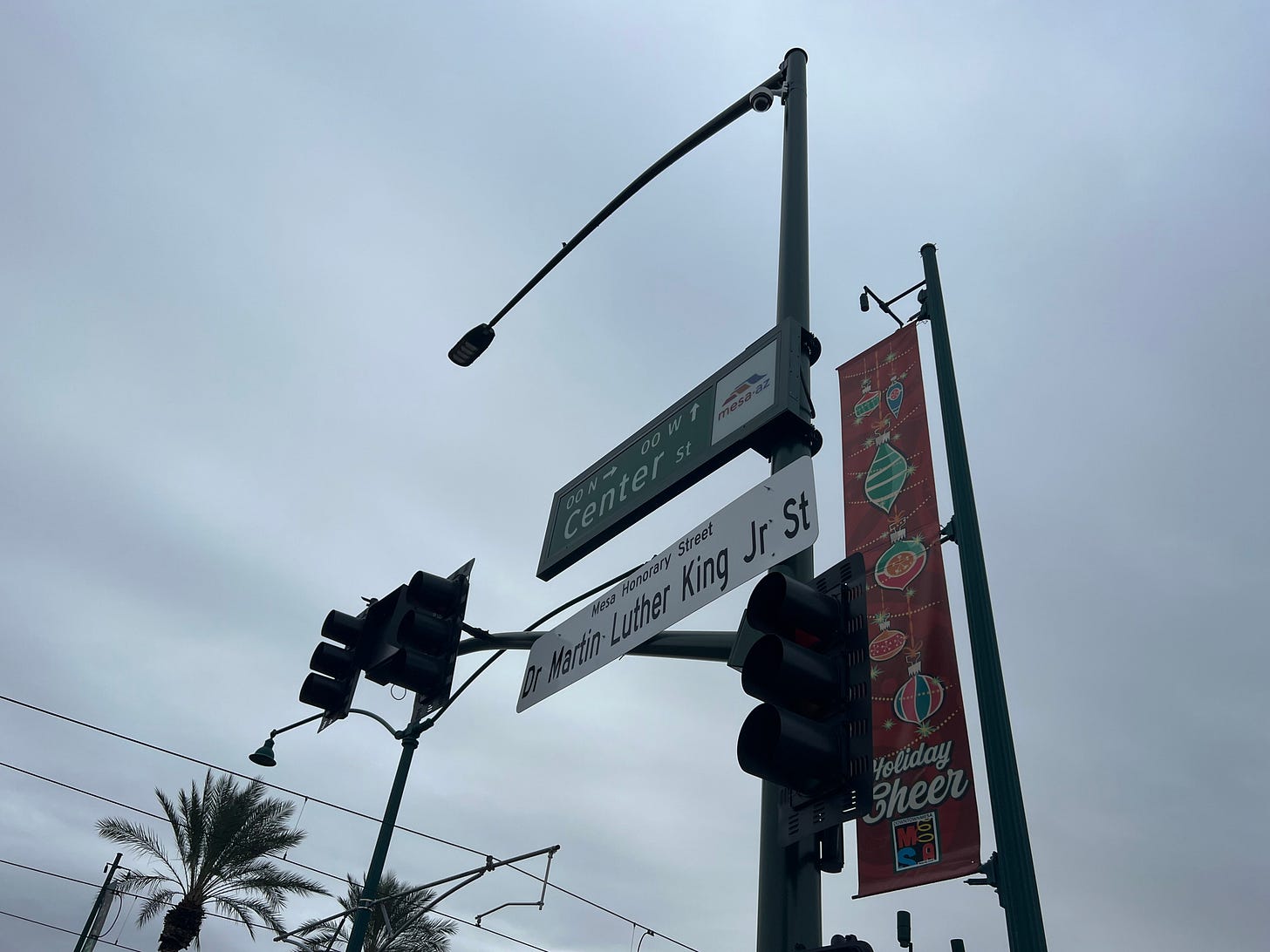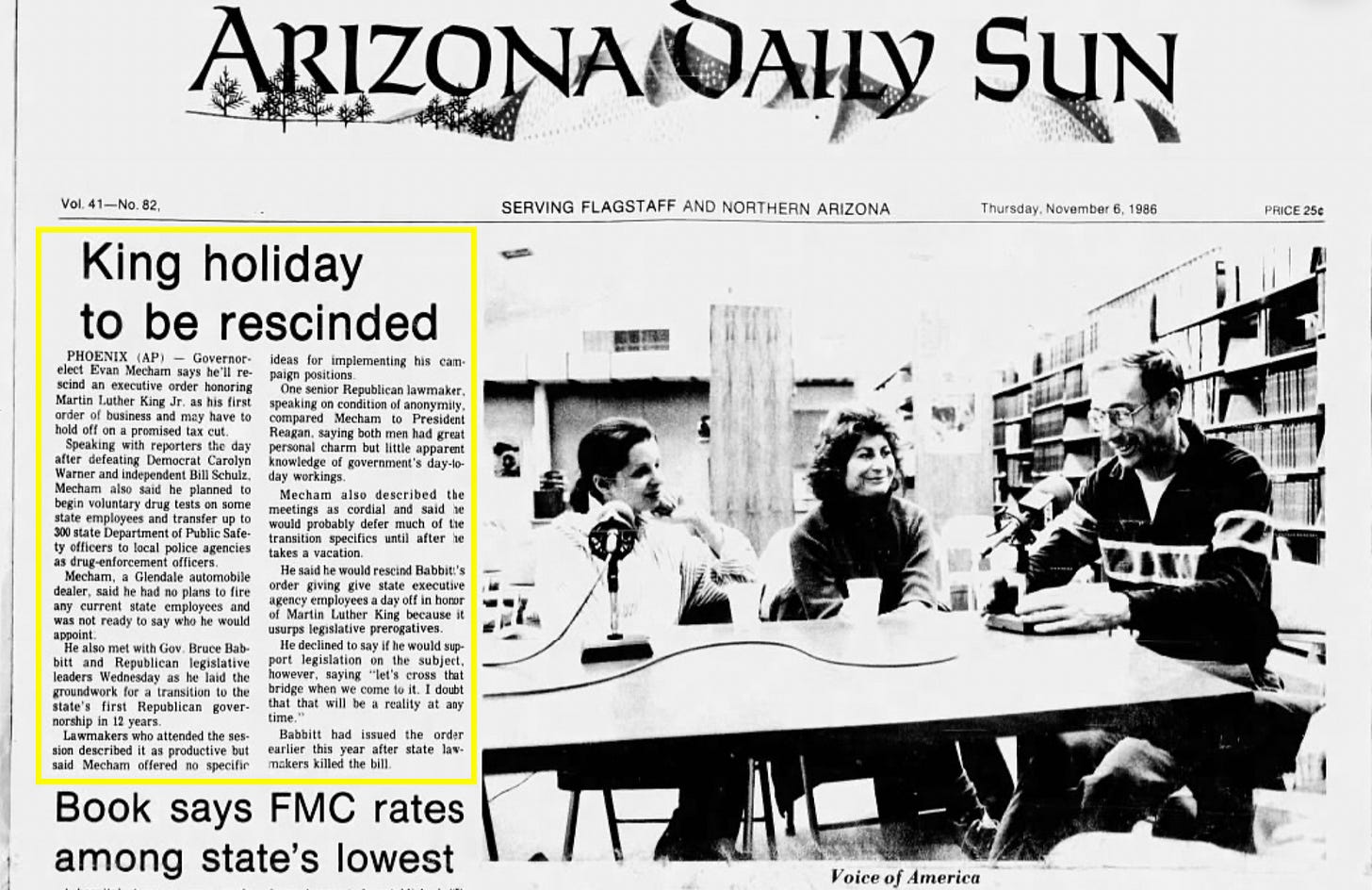BY THE TIME I GET TO ARIZONA: 30 Years of MLK Jr. Day
Today marks Arizona’s 30th official Martin Luther King Jr. Day with honorary festivals, memorial services, and marches occurring throughout the Valley. It was a long road getting here, with Arizona historically failing to observe the holiday for years.
Some cities and towns quickly began memorializing the Civil Rights icon after his 1968 assassination. By 1986, Martin Luther King Jr. Day was formally recognized as a federal holiday. Arizona wouldn’t recognize the day as a paid state holiday until 1992, being the only state to put the decision up for a vote.
In 1986, Democrat governor Bruce Babbitt briefly recognized Martin Luther King Jr. Day but the legality was challenged by the Attorney General. By January 1987, the newly-elected John Birch Society-backed Evan Mecham had rescinded the executive order. It was one of his first acts as Governor. Mecham, who referred to Black children by anti-Black slurs, had campaigned off removing the newly enacted MLK Jr. Day.
“I guess King did a lot for the colored people, but I don’t think he deserves a national holiday,” said Mecham.
In 1990, Arizona voters rejected two propositions that would have recognized the state holiday. The NFL responded by moving the first planned Arizona Super Bowl (XXVII) to Pasadena, California, costing the state hundreds of millions in revenue. Artists, writers, and union leaders also called for a boycott of the state.
Iconically, Public Enemy released their rap anthem “By the Time I Get to Arizona” in protest of Governor Mecham and the 1990 vote. The accompanying music video stirred controversy. Written by the always-outspoken frontman Chuck D, the song opens with Sister Souljah declaring:
“Security of the First World and all allied forces are traveling West to head off white supremacy scheming to destroy the national celebration of Martin Luther King's birthday. Public Enemy believes that the powers that be in the states of New Hampshire and Arizona have found psychological discomfort in paying tribute to a Black man who tried to teach white people the meaning of civilization.”
The next 5 minutes show a fictional paramilitary assassinating politicians who refuse to observe MLK Jr. Day. Spliced in between feature black and white re-enactments of King’s assassination and violence committed against Civil Rights activists.
Condemnations for the video came flooding in, including from Coretta Scott King. New republican governor Fife Symington said the song made him feel “queasy inside” and called Public Enemy “racist” for their comments against Arizonans. Critics blasted the video for its messaging and Public Enemy was lectured for “matching violence with violence.” MTV pulled the music video from their airwaves.
Chuck D stuck by his message in a 1992 Nightline segment on the protest song:
“There has been so much hypocrisy and conspiracy against every single Black leader that has come out, violent or non-violent. Or whatever the want to call it. In the video, I’m making a statement against various things. The holiday that we celebrate in America, the 500 years of genocide on Columbus Day, and yet we’re still going to have a state that doesn’t have a King holiday. That’s ridiculous.”
Nearly 2 decades later, Chuck D also told SPIN Magazine:
“Dr. King died a violent death and I was answering that,” he said. “I’m for peace but I can make a visual statement about how I feel about what happened. The actuality is that I shot a video in rebuttal to something that happened in real life.”
Public Enemy sent audiences an additional anti-racist message by hanging a klansman effigy while performing the song on their 1992 world tour alongside U2 and the Sugarcubes.
For their October 24, 1992 show at the Sun Devil Stadium in Tempe, the rap group gave an even louder message to the Grand Canyon state. They started their set as normal, playing their opening song “Live at Birth.” Then, in protest, they performed their anti-Arizona anthem, dropped the mic and walked off the stage. The set was over.
They wanted to make a statement. Arizona was only weeks away from another Election Day and the proposition to recognize MLK Jr. Day was back on the ballot. Only four days later on The Arsenio Hall Show, Chuck D explained the reason for their Tempe protest:
“It was against our principals to even be in Arizona. At the same time, we had to go there and push a point, it was only 10 days from election day where they could actually vote in a Martin Luther King holiday into existence over there.”
The mounting pressure worked and Arizona voters overwhelmingly approved the MLK Jr. Day proposition the second time around. On January 18, 1993 Arizona officially recognized the Civil Rights hero and held their first paid state holiday. Thousands marched in celebration, including Rosa Parks. Stevie Wonder, who had similarly been boycotting the state, also joined the parade.
Public Enemy songs like “Fight the Power” and “911 is a Joke” remain timeless anti-authoritarian anthems. Locally, the anti-Arizona song has the same effect. In 2010, Chuck D himself reflected on the song in his call to (again) boycott the state over the anti-immigrant SB1070:
“In 1991 Public Enemy wrote a song criticizing Arizona officials, including John McCain and Fife Symington, for rejecting the federal holiday honoring Dr. Martin Luther King Jr. The same politics written about in ‘By the Time I Get to Arizona’ are alive and well in Arizona today.”





